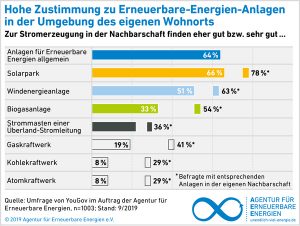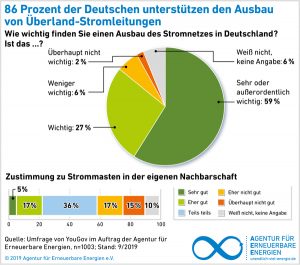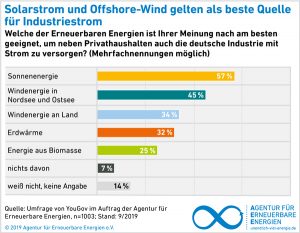 Berlin, 18 October 2019 - Hardly any other topic has been as prominent in recent months as climate protection. A major building block in stopping man-made climate change is the implementation of the energy transition. "Renewable energies can make a huge contribution to reducing greenhouse gas emissions in Germany, in the electricity, transport and heating sectors," says Dr Robert Brandt, Managing Director of the Renewable Energy Agency (AEE). "The German population knows how important renewables are for this. Our new acceptance survey shows that people want the energy transition."
Berlin, 18 October 2019 - Hardly any other topic has been as prominent in recent months as climate protection. A major building block in stopping man-made climate change is the implementation of the energy transition. "Renewable energies can make a huge contribution to reducing greenhouse gas emissions in Germany, in the electricity, transport and heating sectors," says Dr Robert Brandt, Managing Director of the Renewable Energy Agency (AEE). "The German population knows how important renewables are for this. Our new acceptance survey shows that people want the energy transition."
In the current representative survey of the Agency for Renewable Energies (AEE), which was conducted by the opinion research institute YouGov*, nine out of ten citizens (89 percent) are in favour of greater use of renewable energies in Germany. 66 percent even stated that the increased use and expansion of renewable energies was very and extremely important.
Only six per cent consider them to be less important or not important at all. "Citizens have clearly positioned themselves on the role of renewables in the climate issue," says AEE Managing Director Dr Robert Brandt: "Renewable energies are the most important part of the solution."
The approval of renewable energies is also reflected in the fact that 64 per cent of respondents would find it very good or somewhat good if renewable energy plants were located in their neighbourhood. This figure is only eight per cent for coal and nuclear power plants. "It is particularly remarkable that approval even increases if the respondents already have experience with these plants in their neighbourhood," says Brandt. For example, support for a solar park in one's own neighbourhood increases from 66 to 78 percent if there is already a solar park in the immediate vicinity. This positive effect can also be seen with wind energy and biogas plants.
The results of the 2019 acceptance survey clearly show that the German population is far more open to change than is generally assumed.
A total of around 6.4 billion euros was invested in the expansion and maintenance of the electricity grid in 2018. Although there have been protests against the construction of new overland power lines in recent months, overall acceptance of their expansion is very high.
86 per cent of respondents consider the expansion of overland power lines to be important or very and extremely important. For only eight per cent, this is less or not at all important.
However, it is not only electricity generation for private households that is crucial for the implementation of a successful energy transition in the fight against climate change, but also for industry. After all, final energy consumption for electricity totalled 530 billion kilowatt hours in 2017. 57 per cent of citizens surveyed believe that solar energy is the best source for industrial electricity, while 45 per cent consider offshore to be ideal. "Our acceptance survey this year shows that the majority of citizens are behind renewable energies," summarises Brandt. "We can and must show the renewables sector with words and deeds that the German population and politicians recognise and value their role in the much-needed energy transition."
Methodology
The AEE acceptance survey is a Germany-wide, population-representative survey conducted by YouGov on behalf of the Agency for Renewable Energies. A total of 1,003 people aged 18 and over were surveyed online. The survey was conducted between 10 and 13 September.
*This year, the Agency for Renewable Energies has changed the survey institute and the type of survey for its acceptance survey: Instead of the telephone survey by Kantar Emnid among people aged 16 and over, the online survey by YouGov was now conducted among people aged 18 and over. In this respect, comparability with the results from previous years is not readily possible.
Keywords: 100% EEs, Stakeholders, DE-News, Renewable, Climate protection, New books and studies, Transition Town, Environmental policy






